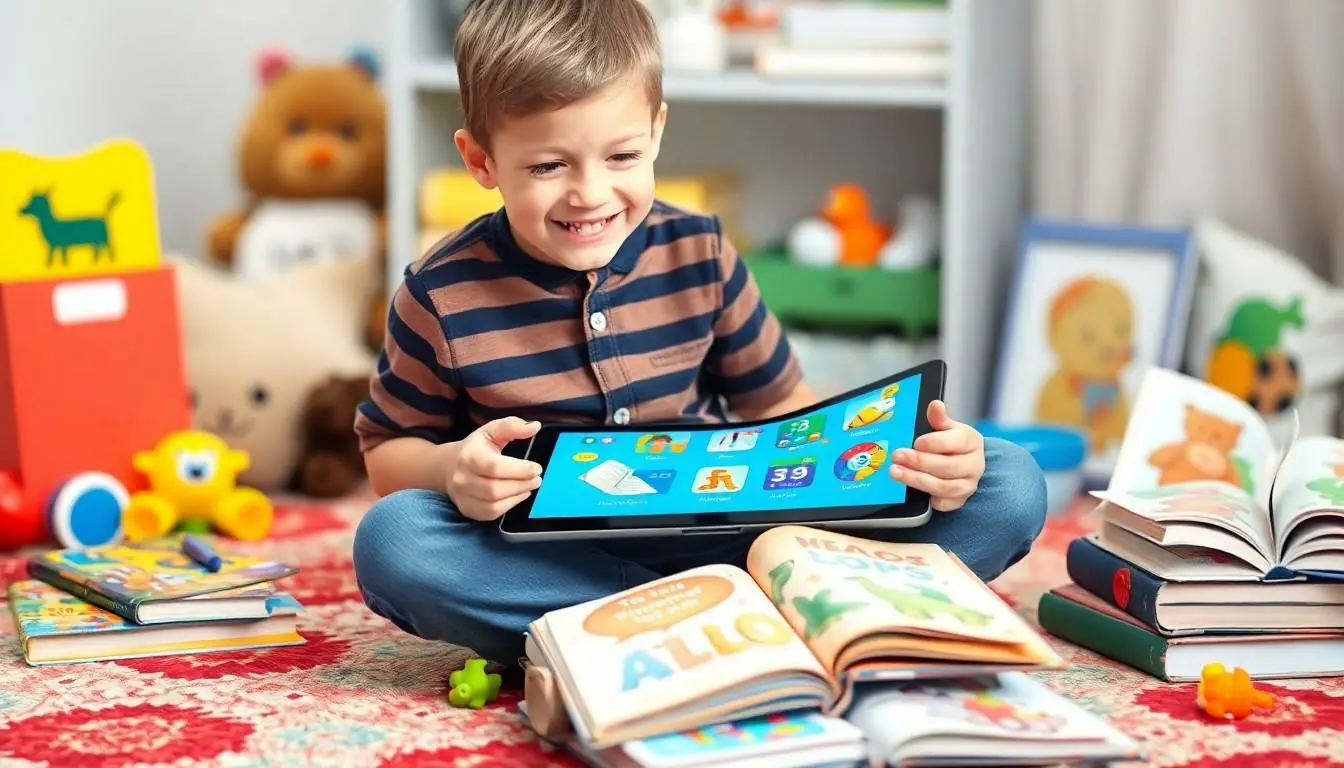Table of Contents
ToggleIn a world where kids are glued to screens, finding the right reading app can feel like searching for a needle in a haystack. But fear not! The digital age has brought forth a treasure trove of reading apps that not only engage young minds but also make reading as fun as a rollercoaster ride through a candy factory.
Importance Of Reading Apps For Kids
Reading apps serve a crucial role in fostering children’s love for literature. Increasingly, these tools offer interactive experiences that capture the attention of young readers.
Benefits Of Digital Reading
Digital reading provides accessibility to diverse content. Children can explore various genres, from adventure to fantasy, expanding their literary horizons. Interactive features engage young minds, making stories come alive through animations and sounds. Convenience enables kids to read anytime and anywhere, fostering a habit of reading regularly. Additionally, many apps offer customization options that allow personalization to suit individual preferences and reading levels.
How Apps Enhance Literacy Skills
Reading apps support the development of essential literacy skills. Phonics games within these platforms help reinforce sound recognition and decoding strategies. Interactive vocabulary exercises introduce new words in context, aiding retention. Audiobooks complement text with audio support, enhancing comprehension. Progress tracking features provide parents insight into their child’s development, allowing tailored support. Engaging formats motivate kids to practice reading, making learning enjoyable and effective.
Top Good Reading Apps For Kids
Numerous reading apps provide excellent tools for fostering children’s literacy skills. Engaging features ensure that kids enjoy the reading process while enhancing their learning experience.
App 1: Overview And Features
Epic! offers a vast library with over 40,000 books, audiobooks, and educational videos for children aged 12 and under. Personalized recommendations make it easy for kids to discover new favorites. Interactive features like quizzes and reading logs encourage kids to track their progress and stay motivated. Availability on various devices ensures that reading can happen anytime, whether at home or on the go.
App 2: Overview And Features
ABCmouse targets children aged 2 to 8, combining a comprehensive curriculum with engaging reading activities. It includes over 850 lessons, each designed to develop reading skills through phonics and vocabulary exercises. Learning paths cater to different skill levels, allowing children to progress at their pace. Moreover, fun interactive games and rewards help maintain interest and excitement in learning.
App 3: Overview And Features
Reading Eggs focuses on making reading fun for kids aged 2 to 13, featuring over 3000 books and interactive reading games. The app adapts to each child’s learning level, ensuring a personalized experience. Progress tracking tools allow parents to monitor reading skills growth while offering detailed reports. Regular updates add fresh content, keeping kids engaged and excited about reading.
How To Choose The Right Reading App
Choosing the right reading app for kids involves considering several key factors. Evaluating these aspects ensures children engage effectively with the material.
Age Appropriateness
Age appropriateness plays a crucial role in selecting a reading app. Every app targets specific age groups, influencing content complexity and subject matter. Younger children benefit from apps that focus on foundational skills like phonics and vocabulary. For instance, apps designed for ages 2 to 8 often incorporate interactive activities that enhance early literacy. Older children, aged 9 to 12, may prefer apps offering diverse genres and longer reading materials. Understanding age-appropriate recommendations encourages children to explore reading at their developmental level.
Features To Look For
Identifying essential features simplifies the app selection process. Priority should be given to interactive elements that engage children and spark their interest in reading. Features such as pronunciation guides, animations, and sound effects create an immersive reading experience. Monitoring progress tools offer parents insights into their child’s development. Gamification elements, like quizzes and rewards, motivate children to read consistently. Accessibility to a wide range of titles shapes a child’s reading habits and preferences, allowing them to discover new interests. Prioritizing these features fosters a love for reading.
User Experience And Feedback
User experience and feedback play significant roles in evaluating reading apps for kids. Parents and educators often share insights that guide others in choosing the best options.
Reviews From Parents
Parents express satisfaction with the engaging features in many reading apps. They appreciate how “Epic!” provides personalized recommendations, making it easier for children to discover books that ignite their interest. Many report that “ABCmouse” effectively supports reading development through interactive lessons. Users find that “Reading Eggs” makes learning enjoyable with its fun games and stories. Feedback highlights how progress tracking features allow parents to monitor achievements, creating a sense of accomplishment in young learners. Overall, parents value apps that combine education with entertainment, ensuring their children develop a lasting love for reading.
Insights From Educators
Educators emphasize the necessity of interactive elements in reading apps. They frequently mention that apps like “ABCmouse” foster essential phonics and vocabulary skills crucial for literacy development. Insights often reveal that gamification keeps students motivated and engaged, reinforcing positive reading habits. Teachers appreciate the variety of genres offered by apps like “Epic!”, catering to diverse interests. Frequent feedback suggests that progress monitoring tools support personalized learning, helping educators tailor instruction to meet each child’s needs. In classrooms, reading apps serve as effective tools that enhance traditional learning methods.
Conclusion
Choosing the right reading app can significantly impact a child’s literacy journey. With so many engaging options available parents have the opportunity to cultivate a love for reading in their kids. By selecting apps that align with their child’s age and interests parents can enhance not only reading skills but also comprehension and vocabulary.
The interactive features and gamification elements found in these apps make reading fun and accessible. As children explore diverse genres and stories they develop a lifelong passion for literature. Investing time in finding the best reading apps ensures that children enjoy learning while building essential skills for their future.








